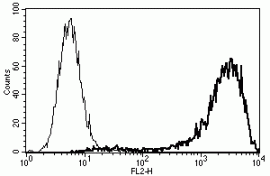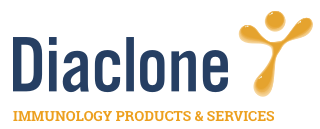Product Type Select Antibody (528) Biologically Active (52) Capture Antibody (26) Cytokine (6) Detection Antibody (26) Dual ELISpot Set (9) Dual Fluorospot Set (9) ELISA Kit (111) ELISA Set (36) ELISpot Kit (29) ELISpot Pairs (20) ELISpot Set (20) Isotype Control (17) Recombinant Antibody (12) Recombinant Protein (19) SARS-CoV-2 (11) SARSCoV2 (8)
Analyte Select ADAM-10 (1) Angiopoietin-2 (3) BCMA (2) BIOTIN (1) c-Myc (1) CD10 (4) CD102 (1) CD102 / ICAM-2 (4) CD105 (5) CD106 (2) CD106 / VCAM-1 (6) CD107a (4) CD109 (3) CD112 (2) CD116 (1) CD117 (1) CD117 / c-kit (4) CD11a / LFA-1 (4) CD11b / MAC-1 (3) CD11c / Integrin a X (2) CD123 (2) CD124 (1) CD126 (1) CD126 / IL-6R (8) CD13 (4) CD130 (1) CD130 / gp130 (10) CD138 (6) CD138 / Syndecan-1 (5) CD14 (6) CD141 (2) CD141 / Thrombomodulin (6) CD146 (2) CD15 (2) CD151 / TA-3 (2) CD154 / CD40L (4) CD16 (4) CD161 (1) CD178/FasL (9) CD18 (4) CD184 (2) CD19 (4) CD196 (3) CD1a (2) CD1b/c (3) CD2 / LFA-2 (5) CD20 (4) CD202b / Tie-2 / TEK (2) CD21 (7) CD213a2 (1) CD213a2 / IL-13Ra2 (3) CD22 (2) CD226 (3) CD23 (4) CD25 (3) CD25 / IL-2R (9) CD27 (1) CD28 (4) CD29 (4) CD3 (4) CD30 (1) CD31 (1) CD31 / PECAM-1 (5) CD33 (1) CD34 Class I (6) CD34 Class III (4) CD35 (1) CD36 (2) CD38 (1) CD4 (4) CD40 (5) CD40L (2) CD41 (2) CD41a / GPIIIb (1) CD43 (3) CD44 (1) CD44 / PGP-1 (4) CD45 (4) CD45RA (3) CD45RO (2) CD48 (2) CD49d (2) CD5 (4) CD50 (5) CD53 (1) CD54 (6) CD54 / ICAM-1 (3) CD55 (1) CD56 / NCAM (3) CD57 (1) CD58 (3) CD59 (3) CD6 (2) CD62E (2) CD62E / E-Selectin (4) CD62L (1) CD62L / L-Selectin (3) CD62P (1) CD62P / P-Selectin (3) CD63 (1) CD64 (2) CD66a (3) CD7 (4) CD71 (3) CD75 (2) CD8 (4) CD80 / B7 / BB1 (3) CD81 (1) CD82 (4) CD86 (6) CD9 (1) CD94 (3) CD95 (1) CD95 / FAS (5) CD99 (2) CX3CL1 (3) Cytochrome C (1) DLL4 (2) Eotaxin (1) EpCam (5) FGF2 (2) FSH (2) Galectin-1 (2) Galectin-10 (3) Galectin-3 (3) Galectin-8 (3) Galectin-9 (6) GM-CSF (4) Granulysin / NKG5 / LAG-2 (4) Granzyme B (7) HBP / CAP 37 / Azurocidin (3) HLA Class I (3) HLA Class II-DQ (2) HLA Class II-DR (7) I-TAC (2) IFN alpha 2a (2) IFN-γ (38) IL-10 (19) IL-12 (8) IL-12p35+p70 (1) IL-12p40 (1) IL-12p40+p70 (5) IL-12p70 (2) IL-13 (10) IL-15 (3) IL-17A (17) IL-17A/F (5) IL-17B (2) IL-17C (2) IL-17F (12) IL-18Ra (3) IL-18Rb (1) IL-1α (4) IL-1β (9) IL-2 (21) IL-21 (2) IL-22 (2) IL-23 (5) IL-23 p19 (1) IL-24 / MDA-7 / Th2-specific cytokine FISP (3) IL-27 (9) IL-28A (2) IL-28B (2) IL-29 (3) IL-31 (3) IL-32 (2) IL-33 (3) IL-34 (5) IL-35 (2) IL-37 (2) IL-4 (20) IL-5 (9) IL-6 (16) IL-7 (6) IL-8 (5) IL1RAP (6) IP-10 (9) Isotype Control (17) KLH (1) L1CAM (3) LL-37 (4) LRRC15 (3) MCP-1 (2) MCP-1 / CCL2 / JE (2) MICA (4) MICB (5) Neurotensin (2) NKp30 (3) NKp44 (1) NKp46 (4) p53 (4) P53 (1) Perforin (16) RANTES (5) RBD domain (5) S1 domain spike protein (2) SARS-CoV-2 Nucleoprotein (1) sCD86 () ST2 () TGF-β1 () TGF-β2 () TIM-3 () TNF alpha () TNF-α () TRAIL () TRAIL () TRAIL / APO2L () TRAIL R1 () TRAIL R1 / DR4 () TRAIL R2 () TRAIL R2 / DR5 () TRAIL R3 () TRAIL R3 / DcR1 () TRAIL R4 () TRAIL R4 / DcR2 () VEGF-A () VEGF-C () VEGF-R1 () VEGF165 ()
Target species Select Human (744) Murine (36) Porcine (2) Rat (21) SARS-CoV-2 (8)
Clone Select 11G2 (1) 8G3 (3) 9E10 (1) B-A1 (4) B-A11 (4) B-A15 (2) B-A19 (3) B-A34 (1) B-A35 (4) B-A38 (6) B-A50 (3) B-A51 (1) B-A52 (1) B-A55 (2) B-A60 (1) B-A67 (1) B-A8 (2) B-B1 (4) B-B10 (3) B-B11 (4) B-B13 (2) B-B15 (4) B-B20 (5) B-B23 (1) B-B29 (4) B-B34 (1) B-B38 (4) B-B46 (1) B-B48 (2) B-B49 (1) B-B5 (3) B-B51 (2) B-B52 (1) B-B53 (1) B-B54 (2) B-B57 (1) B-B58 (1) B-B60 (1) B-B8 (4) B-C10 (3) B-C12 (2) B-C15 (3) B-C3 (4) B-C34 (4) B-C48 (1) B-C49 (2) B-C50 (4) B-C51 (1) B-C52 (2) B-C53 (1) B-C54 (1) B-C55 (2) B-C57 (1) B-C6 (1) B-C60 (1) B-C7 (2) B-D13 (2) B-D15 (4) B-D29 (1) B-D30 (1) B-D37 (1) B-D38 (1) B-D44 (3) B-D48 (6) B-D49 (3) B-D51 (1) B-D52 (1) B-D54 (3) B-D55 (1) B-D59 (2) B-D6 (1) B-D60 (3) B-D69 (1) B-D9 (2) B-E16 (4) B-E2 (5) B-E24 (1) B-E29 (1) B-E3 (3) B-E31 (2) B-E4 (2) B-E43 (3) B-E47 (3) B-E48 (2) B-E5 (4) B-E53 (1) B-E55 (1) B-E60 (1) B-E8 (3) B-F1 (4) B-F10 (4) B-F12 (3) B-F19 (1) B-F2 (4) B-F23 (3) B-F24 (3) B-F3 (2) B-F33 (1) B-F34 (2) B-F42 (2) B-F43 (2) B-F46 (2) B-F49 (1) B-F51 (2) B-F52 (2) B-F55 (1) B-F57 (1) B-F6 (1) B-F60 (2) B-F7 (2) B-G1 (2) B-G24 (3) B-G25 (2) B-G27 (4) B-G28 (3) B-G3 (2) B-G43 (1) B-G44 (2) B-G46 (2) B-G49 (5) B-G5 (3) B-G51 (2) B-G53 (2) B-G54 (1) B-G55 (1) B-G58 (1) B-G6 (4) B-G60 (1) B-H17 (5) B-H20 (4) B-H22 (2) B-H41 (1) B-H44 (1) B-H45 (1) B-H47 (1) B-K11 (1) B-K15 (3) B-K27 (2) B-K29 (3) B-K34 (1) B-K37 (1) B-K38 (2) B-K41 (1) B-K42 (1) B-K43 (1) B-K45 (1) B-K46 (1) B-K48 (2) B-K49 (1) B-K5 (1) B-K60 (1) B-K8 (2) B-K9 (1) B-L2 (3) B-L28 (3) B-L33 (1) B-L34 (1) B-L38 (3) B-L39 (2) B-L42 (2) B-L43 (3) B-L46 (1) B-L47 (1) B-L48 (1) B-L5 (2) B-L51 (2) B-N12 (3) B-N14 (1) B-N18 (2) B-N20 (1) B-N24 (2) B-N28 (1) B-N29 (1) B-N31 (1) B-N36 (3) B-N37 (1) B-N40 (3) B-N42 (1) B-N43 (1) B-N44 (1) B-N6 (2) B-N8 (2) B-P12 (1) B-P24 (4) B-P3 (2) B-P30 (1) B-P35 (1) B-P37 (1) B-P4 (2) B-P40 (2) B-P41 (1) B-P43 (1) B-P47 (1) B-P59 (2) B-P6 (2) B-P7 (2) B-P8 (1) B-R1 (3) B-R14 (2) B-R17 (3) B-R24 (2) B-R3 (2) B-R32 (1) B-R34 (2) B-R35 (3) B-R37 (1) B-R41 (1) B-R46 (1) B-R48 (1) B-R58 (3) B-R6 (4) B-R7 (1) B-R8 (1) B-S10 (2) B-S12 (1) B-S13 (3) B-S16 (2) B-S23 (5) B-S24 (2) B-S29 (1) B-S3 (2) B-S30 (3) B-S31 (1) B-S33 (1) B-S35 (1) B-S36 (1) B-S37 (1) B-S4 (1) B-S40 (1) B-S43 (2) B-S6 (3) B-S7 (1) B-T1 (3) B-T10 (2) B-T2 (2) B-T21 (2) B-T24 (2) B-T3 (4) B-T32 (1) B-T33 (3) B-T35 (1) B-T37 (2) B-T40 (1) B-T42 (1) B-T44 (2) B-T46 (2) B-T47 (4) B-T7 (4) B-V8 (2) B-Z1 (6) B-Z13 (1) B-Z16 (1) B-Z17 (1) B-Z18 (2) B-Z2 (6) B-Z21 (1) B-Z22 (1) B-Z23 (2) B-Z25 (1) B-Z26 (2) B-Z28 (1) B-Z29 (1) B-Z31 (4) B-Z34 (2) B-Z38 (1) B-Z40 (2) BU15 (2) BU49 (1) CR3018 (1) CR3022 (1) CR3022-IgA (1) HI149 (2) HIM3-4 (1) HIP8 (1) LT27 (1) MEM-01 (2) MEM-06 (2) MEM-118 (1) MEM-158 (2) MEM-174 (3) MEM-186 (1) MEM-226 (2) MEM-233 (3) MEM-268 (1) MEM-59 (3) MEM-78 (1) MEM43 (3) MEM48 (4) NC1 (1) PFR-03 (1) PS/2 (1) TR9 () TS53 () TS63 () TS81 () TS82b () TS9 () UCHL1 () UJ11 () W6/32 ()
Format conjugate Select Azide free (296) Biotin (40) FITC (73) PE (60) PercP (4) Purified (124)
Synonym Select 20A/S:478K (1) 20C/501Y.V2 (South Africa) (1) 20I/501Y.V1 (1) 20J/501Y.V3 (Brazil & Japan) (1) 21H (1) 21K (1) ACE-2 protein (1) ADP-ribosyl cyclase (1) Alpha RBD Variant (1) ANG-2 (1) Angiopoietin-2 (2) Angiotensin-I-converting enzyme (1) ANGPT-2 (3) APO-1 (6) APO2L (8) Azurocidin (3) B cell maturation antigen (2) B.1.617.1 (1) B7-1 (3) B7-2 (6) BA2 (1) BB1 (3) BCMA tumor necrosis factor receptor superfamily member 17 (1) Beta RBD Variant (1) BL-CAM (2) BLAST-1 (2) C-C motif chemokine ligand 5 (5) c-Kit (5) C-X3-C motif chemokine ligand 1 (3) C3orf13 (7) CALLA (4) CAMP (Cathelicidin Antimicrobial Peptide) (4) CAP18 (4) CAP37 (3) CCL11 (1) CCL2 (4) CCL5 (5) CCR6 (3) CD154 (2) CD156c (1) CD171 (3) CD269 (3) CD326 (5) CD335 (4) CD336 (1) CD337 (3) CD366 (4) CD40 Ligand (4) CD95L (9) Charcot-Leyden Crystal protein (3) CLC (3) Colombia (1) CR (1) CR2 (7) CXCL10 (9) CXCL11 (2) CXCL8 (5) CXCR4 (2) CYC (1) Cytokine CX2 (2) Cytokine Zcyto7 (2) DcR1 (6) DcR2 (4) Delta-Like Protein 4 (2) DNAM-1 (3) Double mutant (1) DR4 (6) DR5 (5) Drosophila Delta Homolog 4 (2) E-Selectin (6) EBV receptor (7) Ecalectin (6) ELAM-1 (6) END (5) Endoglin (5) FALL39 (4) FAS (6) FAS-Ligand (9) Fc gamma Receptor I (2) FcgRI (2) FGF basic (2) Fibroblast Growth Factor Basic (2) FLJ41744 (2) Flt-1 (1) Follicle Stimulating Hormone (2) Fractalkine (3) G/452R.R3 (1) G/452R.V3 / 21B (1) Gal-8 (3) GAL1 (2) Gamma RBD Variant (1) GH/501Y.V2 / 20H (V2) (1) Glycoprotein S1 (1) GM-CSF R (1) gp130 (11) GP180 (4) GP40 (4) gp67 (1) gp80 (9) GPIIb (1) GPIIIb (1) GPL115 (3) GR/501Y.V1/20I(V1) (1) GR/501Y.V3 / 20J (V3) (1) GR15 (4) H-CAM (5) HAVCR2 (4) HBGF-2 (2) hLib (3) HUAT (6) HVEB (2) ICAM-1 (9) ICAM-2 (5) ICAM-3 (5) IFN-g (25) IFN-gamma (25) IFN-λ3 (2) IFNA2A (2) IgG Fc Receptor I (2) IL-1 RAcP (Interleukin-1 Receptor Accessory Protein) (7) IL-12 (7) IL-12/IL23p40 (8) IL-12p35/p70 (2) IL-12p70 (6) IL-13Ra2 (4) IL-18Ra (3) IL-18Rb (1) IL-1a (4) IL-1alpha (4) IL-1b (9) IL-1beta (9) IL-1F7 (2) IL-1H4 (2) IL-1R4 (5) IL-1RL1 (5) IL-1RP1 (2) IL-2R (2) IL-2R α-Chain (9) IL-3 receptor subunit alpha (2) IL-33 receptor (5) IL-3R alpha (2) IL-4R (1) IL-6R (9) IL1 R3 (7) IL17B (2) IL3RA (2) ILTIF (2) Integrin a4 (2) Integrin aL (3) Integrin aM (3) Integrin aX (2) Integrin b1 (4) Integrin b2 (4) Interferon alpha A (2) Interferon lambda 1 (3) Interferon-lambda 2 (2) Interferon-lambda 3 (2) Interleukin-2 Receptor subunit Alpha (1) IP-9 (2) JE (4) Kappa RBD Variant (1) Keyhole limpet hemocyanin (1) KLRB1, CLEC5B, MGC138614 (1) KLRD1 (3) Kp43 (3) L-Selectin (4) LAG-2 (4) LAM-1 (4) LAMP-1 (4) LAMP-3 (1) LEU1 (4) LEU2 (4) LEU7 (1) Leucine rich repeat containing 15 (2) Lewis x (2) LFA-1 (4) LFA-2 (5) LFA-3 (3) LGALS1 (2) LGALS8 (3) LGALS9 (6) LIB protein (3) LRRC15 (1) Ly94 (4) Ly95 (1) MAC-1 (3) MCAM (2) MDA-7 (3) MIC11 (3) MIC2 (2) MOX44 (1) MS4A1 (4) MUC18 (2) N protein (2) NCAM (3) NCAM-L1 (3) NCR1 (4) NCR2 (1) NCR3 (3) Neurotensin R1 (2) NK4 (2) NKG5 (4) NKR, NKR-P1, NKR-P1A (1) Notch Ligand Delta-2 (2) Nucleocapsid protein (3) Nucleoprotein (1) P-Selectin (4) P1 (1) PCTA-1 (3) PECAM-1 (6) PERB11.2 (5) PETA-3 (2) PGP-1 (5) Protein C16orf77 (5) PRR2 (2) RBD (1) RBD S1 protein (5) RBD spike protein (2) Receptor binding domain Spike protein (7) S protein (1) SARS-CoV nucleoprotein (3) SARS-CoV S (1) SCYA-2 (4) SLAMF2 (2) South Africa (1) SYNDECAN-1 (11) T10 (1) TA-3 (2) TEK (2) TFR (3) TGF-b1 (3) TGF-beta1 () TGF-beta2 () Th2-specific cytokine FISP () Thrombomodulin () Tie-2 () TNF-a () TNF-alpha () TNFRSF17 () TP-120 () TRAIL () TRAIL () TRAIL R1 () TRAIL R2 () TRAIL R3 () TRAIL R4 () TRAP () TROP1 () Variant India Delta () Variant Lineage B.1.1.248 (Brazil & Japan) () Variant Mu () Variant N501Y () Variant Omicron () VCAM-1 () VEGF-A () VLA-4 () VOC-202012/01 (United Kingdom) () VPF () VUI-21APR-01 () ZCYTO21 ()
Search

 Sodium azide is a poisonous and hazardous substance, handle and dispose of properly
Sodium azide is a poisonous and hazardous substance, handle and dispose of properly


